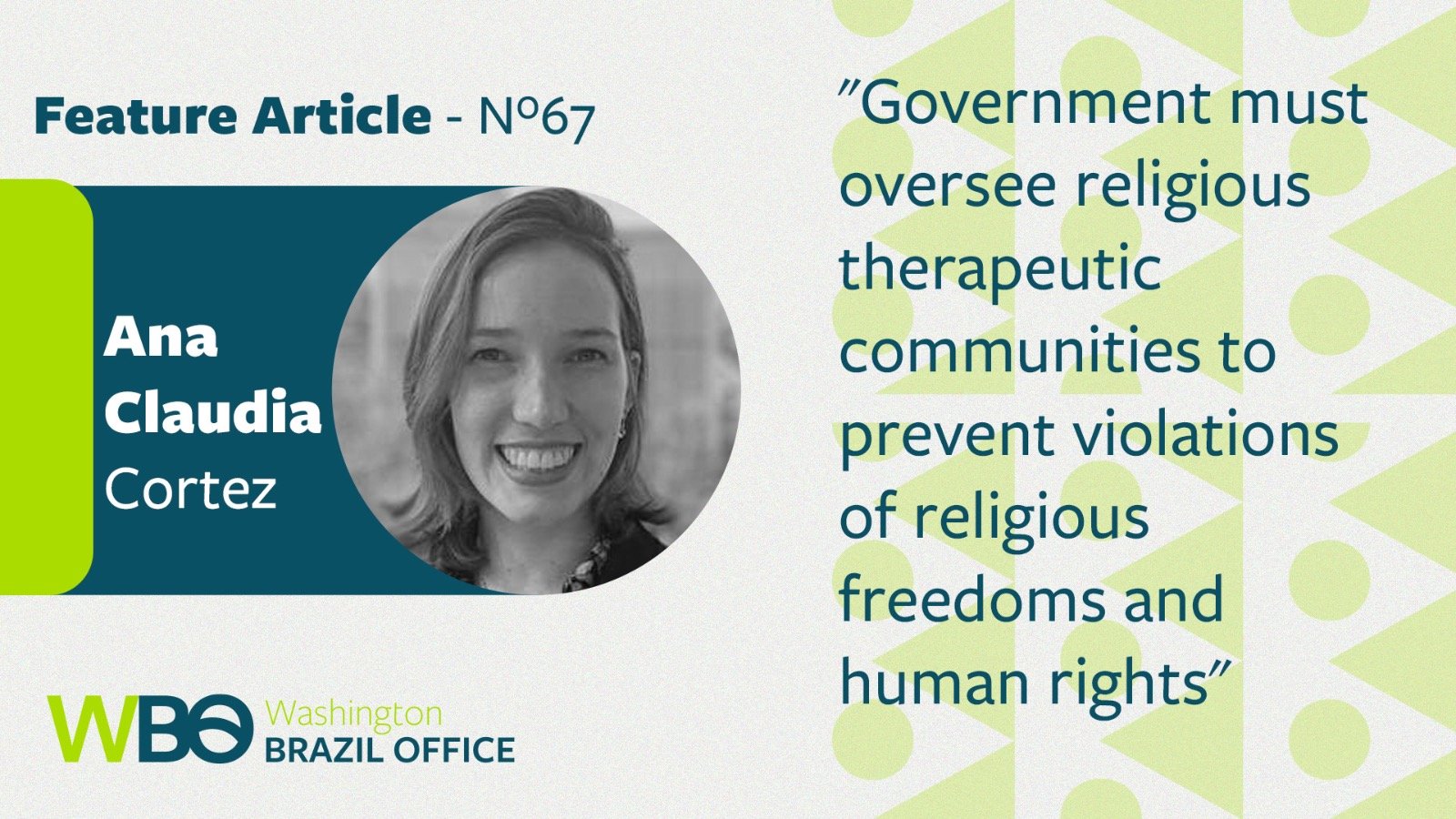The role of religion in drug treatment policy
Ana Claudia Cortez is a Ph.D. candidate in Political Science at the University of São Paulo (USP) and a Junior Researcher at the Center for Metropolitan Studies (CEM/CEBRAP). Currently, she is a visiting research fellow at Brown University, USA. This text was originally written for issue 67 of the WBO Newsletter, published on May 19, 2023. Fill in the form at the bottom of the text to access and subscribe to the WBO weekly newsletter in English.
“When I was 10 years old, I was introduced to drugs […] and ended up in Praça da Sé in São Paulo, Brazil […] It was there that I earned the nickname "Joãozinho Caixão" (a nickname meaning "John Coffin") after committing my first homicide at 13 years old. Following my arrest […] I learned how to rob and kill while in prison […] and continued to commit many more homicides. After years of living a life of crime, I decided to seek treatment at a Therapeutic Community (TC). Throughout my life, I had always been someone who followed orders, and at the TC, I followed the rules and routines while discovering who I truly was […] I have been in a state of abstinence for 38 years now […] and I believe that God has played a role in my transformation. The TC helped me forgive myself and find God”.
This is an excerpt from one of the interviews I conducted for my Ph.D. research with a person who was treated at a TC in Brazil. TCs are private and mostly religious organizations that provide accommodation and offer on-site treatment for people with disorders resulting from the problematic use of psychoactive substances. These organizations deliver services based on coexistence between peers, abstinence, discipline, and spirituality, combining religious practices with assistance from specialized professionals, especially psychologists and social workers.
According to data from the Institute of Applied Economic Research (IPEA), approximately 2,000 TCs in Brazil offer around 83,600 vacancies in their programs. Of them, 83 percent of these organizations are religious, with 40 percent being Pentecostal, 27 percent Catholic, 7 percent mainstream Protestant, and 9 percent other religions. Additionally, 90 percent of these TCs perform prayer, worship, and Bible reading activities as a fundamental part of their treatment.
In recent years, TCs have been critical stakeholders in influencing drug treatment policies in Brazil, confronting (secular) groups that defend non-on-site treatments, particularly those based on harm reduction practices to wean patients off the drugs gradually. These organizations have influenced drug treatment policies in Brazil through different strategies, such as lobbying, electing their representatives to legislative bodies, and directly engaging with bureaucracies, including inserting their representatives into the State bureaucracy.
“The National Mechanism for Prevention and Combating Torture inspected 28 TCs across Brazil and uncovered several human rights violations committed by these organizations, including but not limited to deprivation of liberty, infringement upon religious freedom, and torture”
One of the main demands of TCs to the Brazilian government has been the recognition and maintenance of their religious practices as a treatment method.. This has been one of the major sources of conflict between TCs and the Brazilian state in negotiations over public funding.
Organized into federations, TCs have been presenting their demands to government bodies and have achieved significant gains in recent years. In 2011, during Dilma Rousseff’s administration (2011-2016), these organizations began receiving federal funding, and in 2015, the Regulatory Framework for TCs was published, in which the Brazilian government recognized and regulated their work, including allowing religious practices to be part of treatment procedures. Despite significant progress under Rousseff’s government in expanding public resources invested in TCs, it was during Michel Temer´s administration (2016-2018) and especially in Jair Bolsonaro´s term (2019-2022), that TCs had even more success.
During Temer's administration, guidelines on psychiatric hospitalizations were revised, prioritizing abstinence as the main care strategy for people who engage in abusive use of psychoactive substances in Brazil. However, it was during Bolsonaro's administration that TCs had their most important victories.
The first one was the transfer of responsibility for actions related to the prevention and care of drug abuse from the Ministry of Justice and Public Security to the Ministry of Citizenship, led by Osmar Terra, one of the major advocates for TCs in Brazil.
Another significant victory for TCs during Bolsonaro’s administration was the approval of Law 13.840/2019 (not coincidentally authored by Osmar Terra), which included TCs’ services in the National Drug Treatment Policy.
According to Conectas and CEBRAP, between 2017 and 2020, the federal government's payments to TCs increased by 116.38 percent.
Recently, Lula’s government has signaled its intention to continue financing TCs by creating the Department of Support for Therapeutic Communities. However, this decision has been criticized by movements that advocate for non-site models of care, such as the Federal Council of Psychology, the “Rede Nacional Internúcleos da Luta Antimanicomial” (National Network of the Struggle against Mental Asylums), and others. Many of these criticisms stem from reports of human rights violations that have occurred within Brazilian TCs. In 2017, the National Mechanism for Prevention and Combating Torture inspected 28 TCs across Brazil and uncovered several human rights violations committed by these organizations, including but not limited to deprivation of liberty, infringement upon religious freedom, and torture.
The TCs case in Brazil brings up important reflections on the relationship between religion and politics. Religious groups, especially major ones, have a significant influence on the construction and implementation of public policies. This creates challenges for the separation between religion and state. Churches and religious organizations play a vital role in social action in Brazil, particularly in serving the poor. However, the regulation and oversight of these organizations are necessary to prevent violations of religious freedoms and human rights. Hopefully, the Lula government can make progress in this area.

